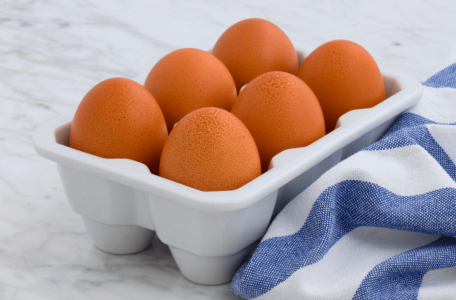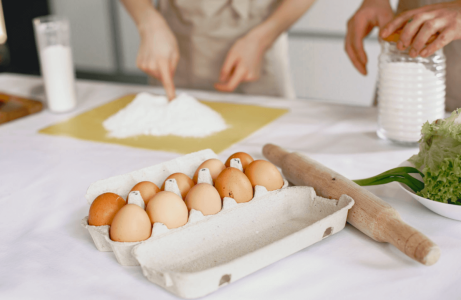The great egg debate: Fridge vs pantry
- Replies 1
Eggs are not only delicious and nutritious but also a versatile ingredient that can be used in almost every meal. Most of us here would probably agree that they're a go-to ingredient for a delicious breakfast, a satisfying lunch, or even a sumptuous dinner.
But when it comes to egg safety, there's a lot of conflicting information out there. Should you store them in the fridge or on your kitchen counter?
This topic is frequently up for debate, but don't worry folks! We're here to help you crack the code and make sure your eggs are always fresh and safe to eat.
Recently, British TV chef James Martin caused a stir when he claimed on a morning TV show that eggs should never be stored in the fridge.
But is this really the best advice? Let's dive in and find out the truth about egg storage.

Here in Australia, the advice from egg producers is that eggs should be stored below 15°C. If the temperature in your kitchen is warmer than this (and in most parts of the country, it most likely will be), then you should store your eggs in the fridge.
Not only can refrigeration preserve the taste and texture of eggs, but it also extends their life and reduces food wastage, too.
But just a friendly reminder, don't put your eggs in that little tray by the fridge door. The temperature there can fluctuate and can make your eggs go bad quicker. Keep them in the main part of the fridge where the temperature's more consistent; your eggs (and your stomach) will thank you.
On the other side of the pond, British nutritionist Kate Llewelyn-Waters has a somewhat different opinion. She explains that where to store your eggs depends on what usage you plan to make of them.
If you plan to separate the egg whites and yolks in the kitchen, like to make mayonnaise, then you should store the eggs in the fridge. But uncooked eggs that will be fried or poached should stay in a cupboard at room temperature.
This is because when you fry a chilled egg, it decreases the oil and pan temperature, so frying takes longer. Likewise, if you're poaching a chilled egg, the lower temperature of the water means it will cook more slowly, increasing the risk that the egg white spreads.
Kitchen cabinet temperatures in the UK, however, are not at all like those in Australia. Therefore, refrigerating eggs is preferable than storing them in the pantry, and before using them in a recipe, it's better to let the eggs sit at room temperature for a bit.

While eggs may seem like a harmless meal staple, they do come with some potential health risks that we should all be aware of.
One such risk is the presence of salmonella, a bacteria that can cause a serious illness known as gastroenteritis. Symptoms include vomiting and diarrhoea, and it can be especially dangerous for vulnerable populations such as pregnant women, young children, older adults and those with weakened immune systems.
The worst part is that there's often no way to tell if an egg is infected, as it won't look or smell any different from a safe one.
This may seem scary, but it's important not to let this fear prevent you from enjoying eggs as part of a healthy diet. While the risk of salmonella contamination is real, there are ways to significantly reduce it.
So, instead of avoiding eggs altogether, here are some necessary precautions to make sure the eggs you're consuming are safe:

When purchasing eggs, it's a good idea to open the carton and check that the eggs look clean and are not cracked. This will help ensure that you're buying fresh, safe eggs.
It's also always best to buy eggs from reputable producers and store them in accordance with the manufacturer's instructions. This will help to keep your eggs fresh and safe to eat.
It's also important to remember never to wash eggs, as this can actually increase the risk of contamination by allowing bacteria to move from the outside of the shell to the inside. Instead, simply discard any eggs that appear oddly dirty.
Always make sure to wash your hands thoroughly before and after handling eggs to prevent the spread of bacteria.
When it comes to your utensils, equipment, and food contact surfaces, such as counters or cutting boards, it's crucial to keep them clean and sanitised after handling eggs or egg products. This will help to prevent the contamination of other foods.
 Members, what do you think about the egg storage debate? Do you store yours in the fridge or on the bench? Let us know in the comments! And be sure to share this article far and wide to keep your friends and family informed.
Members, what do you think about the egg storage debate? Do you store yours in the fridge or on the bench? Let us know in the comments! And be sure to share this article far and wide to keep your friends and family informed.
But when it comes to egg safety, there's a lot of conflicting information out there. Should you store them in the fridge or on your kitchen counter?
This topic is frequently up for debate, but don't worry folks! We're here to help you crack the code and make sure your eggs are always fresh and safe to eat.
Recently, British TV chef James Martin caused a stir when he claimed on a morning TV show that eggs should never be stored in the fridge.
But is this really the best advice? Let's dive in and find out the truth about egg storage.

When it comes to egg safety and storage, there's much debate about whether eggs should be stored in the fridge or a cupboard. Credit: Estudio Gourmet.
Here in Australia, the advice from egg producers is that eggs should be stored below 15°C. If the temperature in your kitchen is warmer than this (and in most parts of the country, it most likely will be), then you should store your eggs in the fridge.
Not only can refrigeration preserve the taste and texture of eggs, but it also extends their life and reduces food wastage, too.
But just a friendly reminder, don't put your eggs in that little tray by the fridge door. The temperature there can fluctuate and can make your eggs go bad quicker. Keep them in the main part of the fridge where the temperature's more consistent; your eggs (and your stomach) will thank you.
On the other side of the pond, British nutritionist Kate Llewelyn-Waters has a somewhat different opinion. She explains that where to store your eggs depends on what usage you plan to make of them.
If you plan to separate the egg whites and yolks in the kitchen, like to make mayonnaise, then you should store the eggs in the fridge. But uncooked eggs that will be fried or poached should stay in a cupboard at room temperature.
This is because when you fry a chilled egg, it decreases the oil and pan temperature, so frying takes longer. Likewise, if you're poaching a chilled egg, the lower temperature of the water means it will cook more slowly, increasing the risk that the egg white spreads.
Kitchen cabinet temperatures in the UK, however, are not at all like those in Australia. Therefore, refrigerating eggs is preferable than storing them in the pantry, and before using them in a recipe, it's better to let the eggs sit at room temperature for a bit.
Key Takeaways
- The conversation on where best to store eggs caused quite a stir recently.
- Nutritionist Kate Llewelyn-Waters suggests that the storage of eggs depends on what situation they are being used in. Eggs used in recipes such as mayonnaise should be kept in the fridge, while eggs that will be poached or fried should be stored in a dry cupboard.
- Experts in Australia recommend that eggs should be stored below 15°C (or refrigerated) to extend the life of the egg and reduce the risk of salmonella.
One such risk is the presence of salmonella, a bacteria that can cause a serious illness known as gastroenteritis. Symptoms include vomiting and diarrhoea, and it can be especially dangerous for vulnerable populations such as pregnant women, young children, older adults and those with weakened immune systems.
The worst part is that there's often no way to tell if an egg is infected, as it won't look or smell any different from a safe one.
This may seem scary, but it's important not to let this fear prevent you from enjoying eggs as part of a healthy diet. While the risk of salmonella contamination is real, there are ways to significantly reduce it.
So, instead of avoiding eggs altogether, here are some necessary precautions to make sure the eggs you're consuming are safe:

One of the first lines of defence against getting salmonella is learning what kinds of eggs are safest to buy from grocery stores. Credit: Pexels/Gustavo Fring.
When purchasing eggs, it's a good idea to open the carton and check that the eggs look clean and are not cracked. This will help ensure that you're buying fresh, safe eggs.
It's also always best to buy eggs from reputable producers and store them in accordance with the manufacturer's instructions. This will help to keep your eggs fresh and safe to eat.
It's also important to remember never to wash eggs, as this can actually increase the risk of contamination by allowing bacteria to move from the outside of the shell to the inside. Instead, simply discard any eggs that appear oddly dirty.
Always make sure to wash your hands thoroughly before and after handling eggs to prevent the spread of bacteria.
When it comes to your utensils, equipment, and food contact surfaces, such as counters or cutting boards, it's crucial to keep them clean and sanitised after handling eggs or egg products. This will help to prevent the contamination of other foods.
Tip
If you're looking for more information on how to properly store food items, be sure to check out one of our previous articles, which delves into which products should be kept in the fridge and which are better off stored at room temperature.







